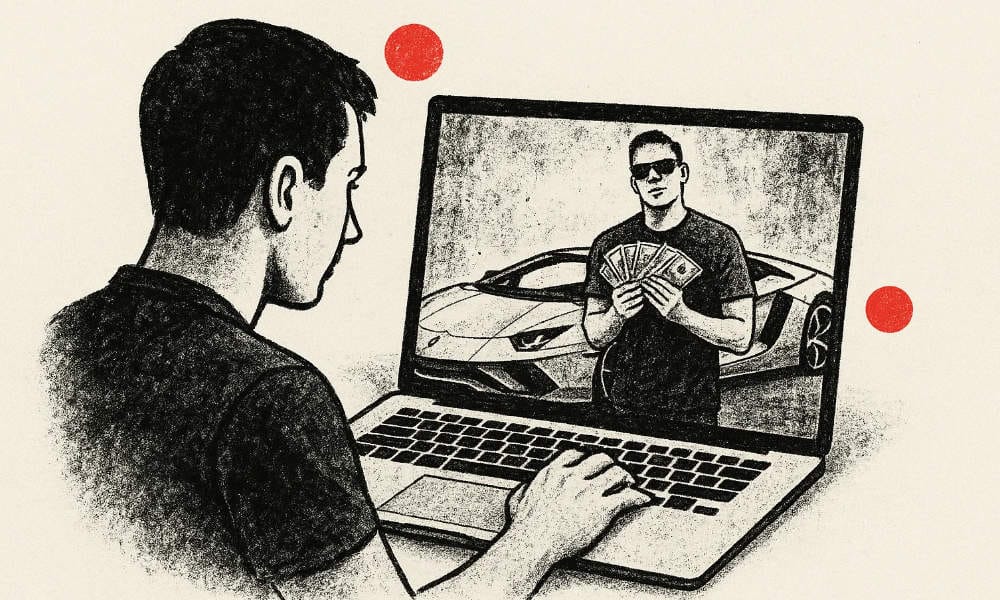The Social Media Trading Lie: Why Most Traders Lose Money
Most trading influencers sell lifestyle fantasies, not trading success. Behind the flashy posts and affiliate links, the reality is simple, most retail traders lose money.

Spend just five minutes scrolling through Instagram or TikTok and you’ll likely come across someone claiming they’ve cracked the code to financial freedom, usually from a beach in Bali, with a laptop open and a chart full of colourful candlesticks in the background.
One moment they’re claiming to be “catching pips”, the next they’re stepping out of a rented Lamborghini, talking about passive income and “letting the markets work for them”.
It all looks effortless. Slick. Aspirational. But it’s all entirely misleading.
I could name several influencers off the top of my head who’ve built entire followings by taking people for a ride. But that’s not the point of this post, and frankly, it’s not my job to play watchdog. What matters more is that you, the viewer, the follower, the hopeful trader, learn to separate performance from performance art. That you start to question what you’re being shown, and more importantly, why you’re being shown it.
The smoke and mirrors only work if no one’s looking closely. Scratch beneath the surface, and most of it falls apart.
The modern trading influencer rarely trades for a living, they sell the idea of trading for a living. Their real income doesn’t come from the markets, it comes from affiliate deals. Behind the filters and fast cars, many of these so-called traders are essentially marketing machines, earning commissions by driving followers to sign up with brokers, funded prop firms, copy trading platforms, course groups or shady mentorships. The game isn’t about mastering the markets, it’s about monetising belief.
This ecosystem thrives on selective storytelling. Losses aren’t good content. No one’s going viral with a confession that they blew their account on Friday night and spent the weekend questioning their life choices. But that’s the side of trading that’s kept quiet. What you see instead is a curated highlight reel, the one winning trade, the “withdrawal proof”, the paid partnership labelled with a tiny hashtag in the corner. It’s a well-oiled illusion that’s difficult to spot if you’re just starting out.
And here’s what you won’t see plastered all over your trading Instagram feed, most retail traders get absolutely crushed. I’m talking about 95% of them losing money – and that’s not me being dramatic. Brokers have to report these numbers by law, though they usually bury them in the fine print where nobody bothers to look.
Think about that for a second. While your feed is full of Lamborghini screenshots and “just made 500% in a day” posts, the reality is that nearly everyone trying this is haemorrhaging cash. All those motivational quotes about “grinding” and “staying disciplined”? They’re not changing the fundamental maths here.
The danger is that newcomers fall for the make-believe. They chase mentors and signal groups, thinking that’s the shortcut to success, not the years of failure and learning real traders endure. Most never realise they’re not being taught, they’re being sold to.
Many of these influencers have never traded with their own capital. They have no track record, no verifiable results, and no skin in the game. But what they do have is a discount code, a prop firm partnership, and a flashy lifestyle to back it up.
The irony? The people who really understand the markets rarely shout about it. Professional traders don’t need Instagram clout or affiliate links. They’re not pitching strategies over reels. They’re busy managing risk, dealing with drawdowns, and focusing on performance over popularity. Their reality is quieter, less glamorous, more grounded, and far less profitable to broadcast.
Trading can be a legitimate career path, but not the way it’s packaged on social media. It’s not a side hustle you pick up in a weekend course. It’s not a path to guaranteed riches. It’s a psychological grind, a constant battle with ego and emotion, and a profession that demands more than most are willing to give.
The real shame is that many people could thrive trading if they approached it with honesty, patience, and humility. But instead, they’re sold a shortcut, and by the time they realise it’s a dead end, it’s often too late.
Be wise! Stay safe!
